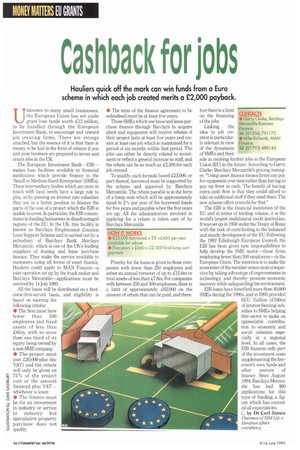Cashback for jobs
Page 38

If you've noticed an error in this article please click here to report it so we can fix it.
Hauliers quick off the mark can win funds from a Euro scheme in which each job created merits a £2,000 payback.
Unknown to many small businesses, the European Union has set aside grant loan funds worth £12 million, to be handled through the European Investment Bank, to encourage and reward job creating firms. There are strings attached, but the essence of it is that there is money to be had in the form of rebates if you and your business are prepared to invest and create jobs in the UK.
The European Investment Bank—EIBmakes loan facilities available to financial institutions which provide finance to the 'Small or Medium Sized Enterprises' (SMEs). These intermediary bodies which are more in touch with local needs have a large role to play, as by passing on interest rate subsidies they are in a better position to finance the parts of the cost of a project which the Ern is unable to cover. In particular, the EIB concentrates in funding businesses in disadvantaged regions of the EU. In the UK, this facility is known as Barclays Employment Creation Loan Support Scheme and is carried out by a subsidiary of Barclays Bank, Barclays Mercantile, which is one of the UK's leading suppliers of leasing and lease purchase finance. They make the service available to customers using all forms of asset finance. Hauliers could apply to MAN Finance—a joint operation set up by the truck maker and Barclays Mercantile—applications must be received by 14 July 1995.
All the loans will be distributed on a firstcome-first-served basis, and eligibility is based on meeting the following criteria: • The firm must have fewer than 500 employees and fixed assets of less than 4,60m, with no more than one third of its equity being owned by a non-SME company.
• The project must cost £20,000-plus (inc VAT) and the rebate will only be given on 75% of the project cost or the amount financed plus VAT— whichever is lower.
• The finance must be for an investment in industry or service to industry but speculative property purchase does not qualify. • The term of the finance agreement to be subsidised must be at least five years.
Those SMEs which use lease and lease purchase finance through Barclays to acquire plant and equipment will receive rebates if their project lasts at least five years and creates at least one job which is maintained for a period of six months within that period. The jobs can either be directly related to investment or reflect a general increase in staff, and the rebate can be as much as 42,300 for each job created.
To qualify, each formula based 423,000, or part thereof, borrowed must be supported by the scheme and approved by Barclays Mercantile. The rebate payable is in the form of a lump sum which will be approximately equal to 2% per year of the borrowed funds for five years and payable when the five years are up. All the administration involved in applying for a rebate is taken care of by Barclays Mercantile.
Priority for the loans is given to those companies with fewer than 250 employees and either an annual turnover of up to £15.6m or total assets of less than £7.8m. For companies with between 250 and 500 employees, there is a limit of approximately £62,000 on the amount of rebate that can be paid, and there
fore there is a limit on the financing of the jobs.
Linking the idea to job creation is particularly relevant in view of the dynamism of SMEs and their role in creating further jobs in the European Union (EU) in the future. According to Garry Clarke, Barclays Mermntile's pricing manager: "Using asset finance means firms can pay for equipment over time rather than having to pay up front in cash. The benefit of having extra cash flow is that they could afford to take on additional staff if they need them. The new scheme offers rewards for that."
The EIB is the financial institution of the EU and in terms of lending volume, it is the world's largest multilateral credit institution. It was set up in 1958 under the Treaty of Rome with the task of contributing to the balanced and steady development of the EU. Following the 1992 Edinburgh European Council, the EIB has been given new responsibilities to help develop the SME sector—those firms employing fewer than 500 employees—in the European Union. The intention is to make the economies of the member states more competitive by taking advantage of improvements in technology, and thereby promote economic recovery while safeguarding the environment.
EIB loans have benefited more than 40,000 SMEs during the 1990s, and in 1993 provided ECU lbillion (£760m) of interest-bearing subsidies to SMEs helping this sector to make an appreciable contribution to economic and social cohesion especially at a regional level. In all cases, the EIB finances only part of the investment costs supplementing the borrower's own funds and other sources of finance. Since August 1994, Barclays Mercantile has had 460 applications for this type of funding, a figure which has exceeded all expectations.
Tel: (01256) 791173 • Mike Richards, MAN Finance. Tel: (01793) 488145.
L by Dr Carl James Chairman of Nbil Lld, European affairs






































































































